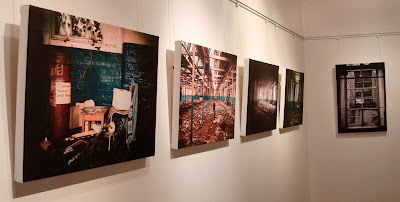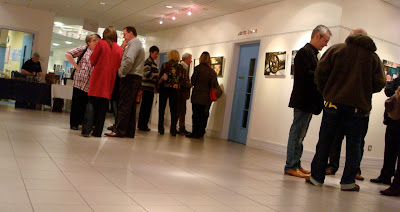Last night, the Through the Mill exhibition opened in Lisburn’s Island Arts Centre.

Back in primary school, I’ve vague memories of being told about local flax growers and the associated linen mills. (I’ve a much stronger memory of visiting Hilden Brewery in P7 and coming away with a blazer pocket-full of tasty hops that I chewed for weeks to come.)
John Barbour’s son William set up Hilden Mill in 1824. It continued to operate until Coats Barbour closed it down in July 2006. Employing up to 2000 workers by the eve of the First World War, Barbour Threads supplied houses and a school (first opened in 1875, rebuilt in 1913) for its workforce.
The stove house and water mill stands 3-storeys high, the boiling house, office and yarn stores 2-storeys high. All other houses occupied in the business is [sic] 1-storey high and the entire building slated. (source)

The striking red brick mill complex is now the scene of rapid urban decay and the subject of David Cleland’s industrial photo exhibition that hangs on printed canvasses on the walls of Gallery 1.
‘Through the Mill’ ... offers us a unique opportunity to see the mill as it is now and a chance to imagine something of the lives of generations of mill workers. The images challenge us to consider our heritage – what has gone before, what will never return, what is our legacy, and what will become of an architectural and industrial landscape on our doorstep?

There are some great images and the canvass blocks work really well. There’s a photo of a five-pane window. One pane is cracked, and printed on canvass you nearly want to reach and touch.
Further along there’s a gargoyle [think it’s photo 14] with peeling paint and just a touch of colour to lift the grey stonework made me step closer to check that the canvass wasn’t cracked rather than the photograph.
Overall the images seem to capture the past and the present. Brickwork and tiling, bits of machinery, cog wheels and painted factory rooms, mixed with the detritus of littered newspapers, decaying décor and the weeds starting to bring new life into the abandoned spaces.
For an amateur who hasn’t been taking serious photographs for very long, I’d expect to see more of David Cleland’s work appearing on walls, pages and screens in the future.

The exhibition runs until Saturday 23 October; the Island Arts Centre is open on weekdays 9.30am–10pm, and 9.30am–5pm on Saturday. And if you’re looking to buy an early Christmas present, you can pick up an A2-sized version of the limited edition digital canvas prints for £100.
No comments:
Post a Comment